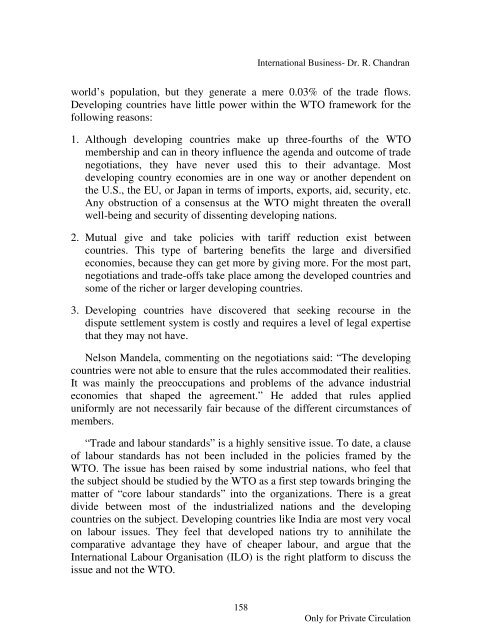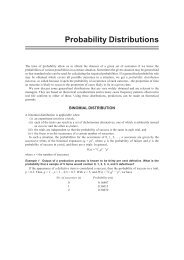International-Business-Dr-R-Chandran-E-book
International-Business-Dr-R-Chandran-E-book
International-Business-Dr-R-Chandran-E-book
Create successful ePaper yourself
Turn your PDF publications into a flip-book with our unique Google optimized e-Paper software.
158<br />
<strong>International</strong> <strong>Business</strong>- <strong>Dr</strong>. R. <strong>Chandran</strong><br />
world’s population, but they generate a mere 0.03% of the trade flows.<br />
Developing countries have little power within the WTO framework for the<br />
following reasons:<br />
1. Although developing countries make up three-fourths of the WTO<br />
membership and can in theory influence the agenda and outcome of trade<br />
negotiations, they have never used this to their advantage. Most<br />
developing country economies are in one way or another dependent on<br />
the U.S., the EU, or Japan in terms of imports, exports, aid, security, etc.<br />
Any obstruction of a consensus at the WTO might threaten the overall<br />
well-being and security of dissenting developing nations.<br />
2. Mutual give and take policies with tariff reduction exist between<br />
countries. This type of bartering benefits the large and diversified<br />
economies, because they can get more by giving more. For the most part,<br />
negotiations and trade-offs take place among the developed countries and<br />
some of the richer or larger developing countries.<br />
3. Developing countries have discovered that seeking recourse in the<br />
dispute settlement system is costly and requires a level of legal expertise<br />
that they may not have.<br />
Nelson Mandela, commenting on the negotiations said: “The developing<br />
countries were not able to ensure that the rules accommodated their realities.<br />
It was mainly the preoccupations and problems of the advance industrial<br />
economies that shaped the agreement.” He added that rules applied<br />
uniformly are not necessarily fair because of the different circumstances of<br />
members.<br />
“Trade and labour standards” is a highly sensitive issue. To date, a clause<br />
of labour standards has not been included in the policies framed by the<br />
WTO. The issue has been raised by some industrial nations, who feel that<br />
the subject should be studied by the WTO as a first step towards bringing the<br />
matter of “core labour standards” into the organizations. There is a great<br />
divide between most of the industrialized nations and the developing<br />
countries on the subject. Developing countries like India are most very vocal<br />
on labour issues. They feel that developed nations try to annihilate the<br />
comparative advantage they have of cheaper labour, and argue that the<br />
<strong>International</strong> Labour Organisation (ILO) is the right platform to discuss the<br />
issue and not the WTO.<br />
Only for Private Circulation





